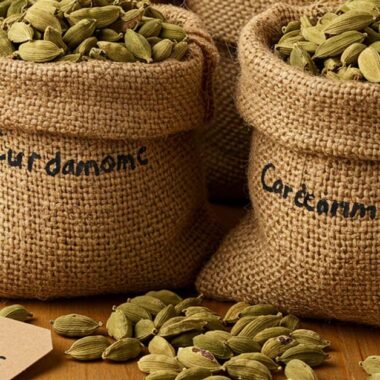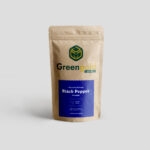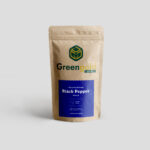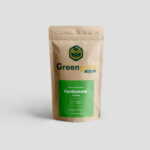Cardamom, often referred to as the Queen of Spices, has been a significant part of Ayurvedic medicine for centuries. Known for its healing properties, cardamom is used to balance the three doshas (Vata, Pitta, and Kapha) and support various bodily functions. Whether in the form of a spice or essential oil, cardamom is revered for its ability to enhance digestive health, detoxify the body, and promote mental clarity. In this blog, we’ll explore how cardamom is used in Ayurveda for overall well-being.
🌸 Traditional Ayurvedic Benefits of Cardamom
1️⃣ Digestive Health 🥄
Cardamom is known for its digestive properties and is often used in Ayurveda to aid in the digestion of heavy foods. It stimulates agni, or digestive fire, helping the body to break down and absorb nutrients efficiently. If you experience bloating, gas, or indigestion, cardamom can help soothe your digestive system and restore balance.
Ayurvedic Remedy:
- Cardamom tea: Boil 1-2 cardamom pods in water, add a little honey, and drink to soothe the stomach.
- Cardamom powder: Mix 1/4 teaspoon of cardamom powder with warm water after meals for better digestion.
2️⃣ Detoxification and Cleansing 🌱
Cardamom is a powerful herb that helps to detoxify the body by promoting the elimination of toxins (ama) and improving circulation. It supports the liver and kidneys, allowing the body to naturally detoxify and cleanse.
Ayurvedic Remedy:
- Cardamom and ginger drink: A blend of cardamom and ginger tea can help cleanse the digestive tract and boost metabolism. It also helps purify the blood and remove impurities from the body.
3️⃣ Balancing the Doshas 🌿
In Ayurveda, cardamom is considered a tridoshic herb, meaning it can balance all three doshas – Vata, Pitta, and Kapha. It has a sweet, pungent, and warm quality, making it a versatile spice that supports overall balance in the body.
- For Vata (Air and Ether): Cardamom’s warmth and sweetness help to ground and calm the Vata dosha, which tends to be dry, cold, and erratic.
- For Pitta (Fire and Water): Cardamom has cooling properties that help to pacify the fiery and irritable Pitta dosha.
- For Kapha (Earth and Water): Cardamom’s stimulating qualities can help balance the heavy and sluggish nature of Kapha dosha.
Ayurvedic Remedy:
- Cardamom oil: Use a few drops of cardamom essential oil to balance the doshas. Diffuse it or massage into the skin for calming effects.
4️⃣ Respiratory Health 🌬️
Cardamom has been used for centuries in Ayurvedic medicine to treat respiratory issues. It is considered an excellent remedy for asthma, coughs, and sinus congestion. Its anti-inflammatory and expectorant properties help to open the airways, making it easier to breathe and soothe the lungs.
Ayurvedic Remedy:
- Cardamom steam inhalation: Boil water with cardamom and inhale the steam to relieve congestion and clear the airways.
- Cardamom tea for respiratory health: Drink cardamom tea mixed with honey and clove to soothe the throat and lungs.
5️⃣ Mental Clarity and Stress Relief 🧘♀️
Cardamom has a natural calming effect on the mind, making it an excellent herb to reduce stress and anxiety. It has been used in Ayurveda to promote mental clarity, improve focus, and balance emotions. Its uplifting fragrance is believed to stimulate the crown chakra and promote positive energy flow.
Ayurvedic Remedy:
- Cardamom and saffron tea: A warm cup of tea made with cardamom and saffron is said to relieve mental fatigue and promote a sense of calm and clarity.
- Cardamom aromatherapy: Use cardamom essential oil in a diffuser to promote mental clarity and reduce stress.
6️⃣ Cardamom for Skin Health 🌸
Cardamom is used in Ayurveda to treat skin conditions such as acne, blemishes, and skin irritation due to its anti-inflammatory and antibacterial properties. It helps to detoxify the skin, giving it a healthy glow and reducing the appearance of blemishes.
Ayurvedic Remedy:
- Cardamom face mask: Mix cardamom powder with honey and turmeric to make a face mask that soothes and cleanses the skin.
- Cardamom oil: Apply diluted cardamom essential oil to blemishes or acne to reduce inflammation and redness.
🌿 How to Incorporate Cardamom into Your Ayurvedic Routine
1️⃣ Cardamom Tea
A warm cup of cardamom tea is one of the simplest ways to enjoy its benefits. You can add cardamom to your regular herbal tea or make a special cardamom infusion by boiling cardamom pods in water with a bit of honey and lemon for a soothing, cleansing drink.
2️⃣ Cardamom Oil
Cardamom essential oil is a versatile oil used for massage, diffusion, or topical application. It can be diluted with a carrier oil (like jojoba or coconut oil) and used to soothe sore muscles, relieve stress, or balance the doshas.
3️⃣ Cardamom in Cooking
Incorporate cardamom into your diet by adding it to curries, rice dishes, smoothies, and desserts. It adds a warm, aromatic flavor that also benefits your digestive health. Ayurvedic practitioners recommend consuming it regularly to maintain balance in the body.
🌿 Conclusion
Cardamom is a powerful herb in Ayurveda, celebrated for its ability to balance the body, mind, and spirit. Whether you’re looking to improve your digestion, relieve stress, enhance your skin health, or purify your body, cardamom offers a range of benefits that can be easily incorporated into your daily routine. By using cardamom in its many forms – as a spice, essential oil, or herbal remedy – you can experience the centuries-old wisdom of Ayurvedic healing.












